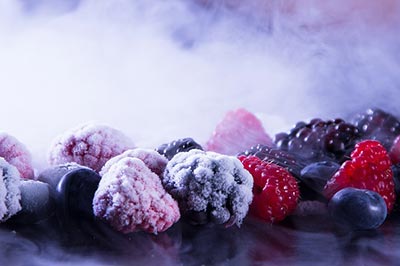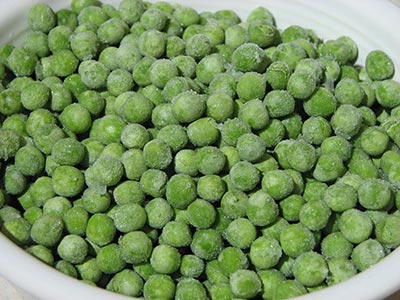Storing Fruits, Vegetables, and Herbs
Long-Term Storage
If you end up with way too much of a good thing, nearly all fruits and vegetables can be stored in the freezer effectively with the exception of lettuces. Due to the different textures and properties of fresh produce, there are a variety of techniques you can use to get the best results.
Freezing Fruits:
 Wash fruits and sort for damage before freezing. Experts recommend cutting fruits into small pieces and similarly to fresh berries, arrange them in a single layer on a sheet pan and freeze them before transferring to airtight containers or freezer bags. In the case of delicate berries like strawberries and raspberries, you can prepare them before freezing with a coat of sugar or sugar syrup, while naturally sealed berries like blueberries, cranberries, and currants do well with no extra preparation. Delicate berries tend to get a little mushy when thawed fully before use, so it’s advisable to find ways to use them while still slightly frozen, such as in smoothies or as ice cream toppings. For fruits that tend to brown such as apples, peaches, nectarines, and apricots, you can pretreat them with ascorbic acid (Vitamin C). You can find ascorbic acid in powdered form in health food stores, drug stores, or the vitamin aisle of some grocery stores. To make a protectant for your delicate fruits, dissolve a half-teaspoon of ascorbic acid powder in three tablespoons of water and sprinkle over cut fruits. Alternately, you can prepare a dip with about a quart of water and a tablespoon of lemon juice. Dip sliced fruit in the bath and allow the surface to dry before freezing. Fruits are best used after being frozen by being allowed to thaw at room temperature before use.
Wash fruits and sort for damage before freezing. Experts recommend cutting fruits into small pieces and similarly to fresh berries, arrange them in a single layer on a sheet pan and freeze them before transferring to airtight containers or freezer bags. In the case of delicate berries like strawberries and raspberries, you can prepare them before freezing with a coat of sugar or sugar syrup, while naturally sealed berries like blueberries, cranberries, and currants do well with no extra preparation. Delicate berries tend to get a little mushy when thawed fully before use, so it’s advisable to find ways to use them while still slightly frozen, such as in smoothies or as ice cream toppings. For fruits that tend to brown such as apples, peaches, nectarines, and apricots, you can pretreat them with ascorbic acid (Vitamin C). You can find ascorbic acid in powdered form in health food stores, drug stores, or the vitamin aisle of some grocery stores. To make a protectant for your delicate fruits, dissolve a half-teaspoon of ascorbic acid powder in three tablespoons of water and sprinkle over cut fruits. Alternately, you can prepare a dip with about a quart of water and a tablespoon of lemon juice. Dip sliced fruit in the bath and allow the surface to dry before freezing. Fruits are best used after being frozen by being allowed to thaw at room temperature before use.
Freezing Vegetables:

The most popular method for freezing vegetables is to blanch and shock them. Blanching prevents enzymes from damaging color, flavor, and nutrients. Blanching also destroys microorganisms that may be lingering on the surface of the vegetables. To properly prepare veggies for a deep freeze, clean and trim, then blanch briefly in boiling water. Once lightly blanched, submerge the vegetables in an ice water bath to prevent them from cooking. Once properly cooled, allow to dry on a paper-towel lined sheet pan and freeze. To pack frozen vegetables properly, the key is keeping moisture inside the package and air outside as contact with air can cause changes in flavor and color to your vegetables when you attempt to thaw and use them. Pack veggies in air tight containers or heavy-duty freezer bags, taking care to force out as much air as possible. A few hours before freezing fresh vegetables, set the freezer to the coldest setting to freeze them as quickly as possible. Time lost is flavor and quality lost. When thawing for use, most vegetables packed in this manner can go directly from freezer to pan, though corn does best when allowed to thaw a bit at room temperature before cooking.
Freezing Herbs:
In the case of herbs, there are a few tricks to keep them not only fresh, but also ready to use in convenient portions. To do this, simply cut up or mince leafy herbs and place them into an ice cube tray. Add olive oil to the tray to cover the herbs and freeze. Once frozen, place the cubes into a freezer bag where they will be ready to pop in and add freshness to your favorite foods when you’re ready. If you prefer to cook with less oil, you can also use water in place of olive oil to achieve the same result.
Drying Herbs:
In a similar fashion to storing sentimental flowers, drying herbs is another way to preserve them for long-term storage and use. Wash the herbs thoroughly, then lay them out on towels to dry a little. Tie the stems together in a bundle with rubber bands and hang the bundles upside-down in a window. Sunshine will naturally help the herbs dry out and crisp up. After a week or so, you can remove and crush the leaves as desired and store in jars until ready to use. No matter how you obtained a surplus of fresh fruits, herbs, and vegetables, storing them properly is important in allowing you to enjoy them at their best, and for more than a short period of time. Hopefully these tips will help you to enjoy your bounty well beyond harvest time! Page 1 0f 2
 Home and Gardening Ideas At home and Gardening ideas we believe inspiring readers about homesteading, self sufficiency
Home and Gardening Ideas At home and Gardening ideas we believe inspiring readers about homesteading, self sufficiency





